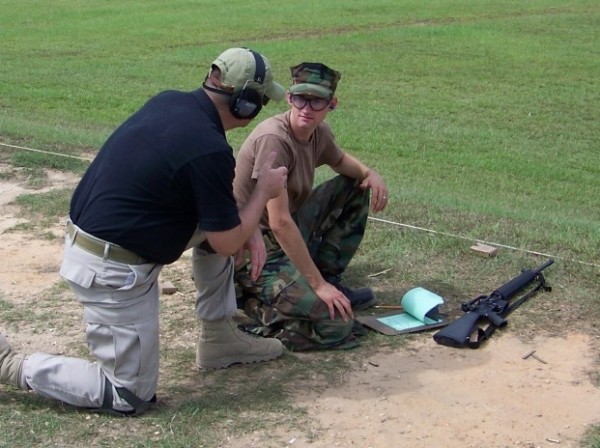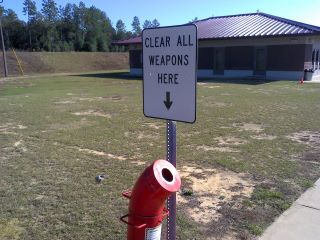Navigate This Post

Thoughtful firearms training instructor or shooting robot: which are you?
[memb_include_partial id=15899]
Though I have previously read various versions of the psychology experiment referenced below, this morning while perusing my email it occurred to me that this is an excellent avenue to consider an all too prevalent phenomenon in firearms training. Take a moment to consider the following:
Have you rated us on iHeartRadio yet?
Click Here to “Heart” us and Leave a Comment below the episodes >>
PSYCHOLOGY 101 – HUMAN BEHAVIOR EXPERIMENT
The Method
If you start with a cage containing four monkeys, and inside the cage hang a banana on a
string from the top. Then you place a set of stairs under the banana. Before long, a monkey will go to the stairs and climb toward the banana.
As soon as he touches the stairs, you spray ALL the monkeys with cold water. After a while, another monkey makes an attempt with the same result. ALL of the monkeys get sprayed with cold water. Pretty soon when another monkey tries to climb the stairs, the other monkeys will try to prevent it.
Now, put the cold water away. Remove one monkey from the cage and replace it with a new monkey. The new monkey sees the banana and attempts to climb the stairs. To his shock, ALL of the other monkeys beat the crap out of him. After another attempt and attack, he knows that if he tries to climb the stairs he will be assaulted.
Next, remove another of the original four monkeys, replacing it with a new monkey. The newcomer goes to the stairs and is attacked. The previous newcomer takes part in the punishment – with enthusiasm — because he is now part of the “team.”
Then, replace a third original monkey with a new monkey, followed by the fourth. Every time the newest monkey attempts the stairs, he is attacked.
The Result
Now, the monkeys beating him up have no idea why they were not permitted to climb the stairs. Neither do they know why they are participating in the beating of the newest monkey. Finally, having replaced all of the original monkeys, none of the remaining monkeys will have ever been sprayed with cold water. Nevertheless, not one of the monkeys will try to climb the stairway for the banana.
Why you ask? Because in their minds, that is the way it has always been!
(DISCLAIMER: This is not meant to disrespect the monkeys.)
The Way It’s Always Been; Firearms Training

Empty your guns before entering the live-fire range?
For three decades, I have been involved in firearms training with the U.S. Military, various police agencies, and private organizations. Taking firearms training and working as a trainer all over the country, I frequently encounter the “That’s the way it’s always been.” mentality when questioning or discussing how or why certain things were taught.
The U.S. Military is the absolute biggest offender, seconded only by U.S. Law Enforcement. Just like the monkeys, firearms training cadre members filter in one or two at a time and are schooled in the “way”. Eventually, everyone at the training facility is teaching or demonstrating a certain way, but no one has any idea why.
Certain methods, techniques, and gear are forbidden on a range or in a school, as well. No one can tell you why other than the thoughtless “it’s not safe” or “because that’s the way it is”.
Here’s an example. Students arriving at the entry gate of a federally-funded law enforcement shooting range are greeted by a red clearing barrel and a sign instructing them to clear all loaded weapons before entering the range. Once through the gate, students walk down a concrete sidewalk to the live-firing ranges, pick up their ammunition and begin firearms training.
The only answer I could get to the question as to why you would want cops to fiddle with their holstered, loaded guns before walking onto a shooting range was an anemic “because of safety”.
Engage Your Brain
Yes, I absolutely understand that certain policies and procedures are in place for good reason. Experience teaches us what works and what does not. However, every once in a while it is a good idea to engage your brain and consider just why it is that we teach or train a certain way. Are we training in a particular manner because it is the most effective and efficient method or are we doing it “just because?”
A fresh perspective can be very beneficial. It is human nature to get comfortable with your current situation and stop thinking analytically. Rather than beat the new monkey for attempting to get the banana you might want to let him try while risking the cold water. Sadly, the cold water of realizing that the old ways aren’t necessarily the best ways is so scary to people that they aren’t willing to take a risk.
Before you spout a phrase like “because we’ve always done it that way” you might pause for consideration. Intellectual laziness is not a valid reason to keep doing something over and over like a mindless robot. The new monkey might actually be on to something.
If you are looking for firearms training and a fresh perspective, you might consider Student of the Gun University or www.SOTGU.com
Professor Paul Markel
Latest posts by Professor Paul Markel (see all)
- Tactical Rifle Tips: Transition Drills - January 5th, 2024
- 40/20/25 Shooting Drill - October 29th, 2023
- Working With Your Body Armor - October 3rd, 2023
- Hi-Point YC9: Yeet Cannon - August 14th, 2023
- Texas Hog Hunting: Day or Night w/ One Rifle - July 25th, 2023
Great analysis….thanks for the food for thought!
As long as someone doesn’t fall prey to the illogical and non-analytical idea that just because something is new then it must be better, there is certainly nothing wrong with looking at things from a new perspective. The problem is when a new monkey comes into the cage and wants to start telling all the other monkeys that they are doing everything wrong and expecting them all to adopt his new ways and then starts playing the victim–like some rejected messiah–when they don’t treat him like God’s messenger.
This is the very reason that I feel kept my as a SSG in my career. I constantly questioned “this is how we’ve always done it”. This is only one of the thousands of things that the Army does that never made any sense.
As long as someone doesn’t fall prey to the illogical and non-analytical idea that just because something is new then it must be better, there is certainly nothing wrong with looking at things from a new perspective. The problem is when a new monkey comes into the cage and wants to start telling all the other monkeys that they are doing everything wrong and expecting them all to adopt his new ways and then starts playing the victim–like some rejected messiah–when they don’t treat him like God’s messenger.
Great analysis….thanks for the food for thought!
This is the very reason that I feel kept my as a SSG in my career. I constantly questioned “this is how we’ve always done it”. This is only one of the thousands of things that the Army does that never made any sense.